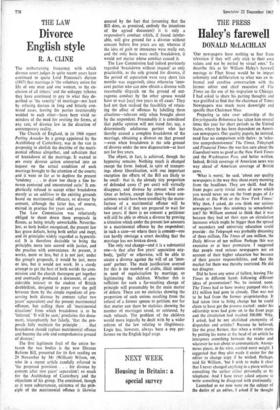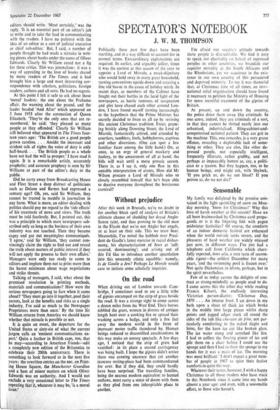Haley's farewell
THE PRESS DONALD McLACHLAN
'Our newspapers have nothing to fear from television if they will only stick to their own values and not be misled by visual ones.' To describe this as Sir William Haley's farewell message- to Fleet Street would be to impart solemnity and deliberation to what was an in- formal and carefree conversation with the former editor and chief executive of The Times on the eve of his migration to Chicago. I had asked to share his parting thoughts and was gratified to find that the chairinan of Times Newspapers was much more downright and specific than Chairman Mao.
Preparing to take over editorship of the Encyclopaedia Britannica has taken him several times this year for short periods to the United States, where he has been dependent on. Ameri- can newspapers. Our quality papers, he insisted, need fear no comparison with theirs: in 'selec- tive comprehensiveness' The Times, Telegraph and Financial Times (he was less sure about the Guardian) were as good as-the New York-Times and the Washington Post, and better written. Indeed, British coverage of American news was way ahead of American coverage of British news.
'What is worst,' he said, 'about our quality newspapers is the way they shout every morning from -the headlines. They are shrill. And the front pages carry trivial items of- news which you would never see on the front pages ,of Le Monde or Die Welt or the New York Times.' Why then, I asked, do you think our serious newspapers have this tendency to sensational- ism? Sir William seemed to think that it was because they had set their eyes on circulation increases which might be- bigger than the spread of secondary and university education could provide : the Telegraph was probably dreaming of three million, The Times of one million, the Daily Mirror of ten million. Perhaps this was excessive or at least premature. 1 suggested that people read serious newspapers not on account of their higher education but because of their greater responsibilities, and that the market for them was thereby restricted. He did not disagree.
Did he have any sense of failure, leaving The Times in different - hands following different ideas of presentation? No, he insisted, none. The Times had to have money pumped into it; Elf million had gone in already. That was not to be had from the former proprietorship. It had taken time to bring change but he could claim to have got the process started : under his editorship news had gone on to the front page and the circulation had reached 300.000. Why, I asked, had he not: abolished anonymity of dispatches and articles? Because he believed, like the great Barnes, that when a writer starts by putting his name at the head of an article he interposes something between the reader and whatever he was about to communicate. Anony- mous pieces, in his view, carried more weight. I suggested that they alsb made it easier for- the editor to change copy if he wished. Perhaps, said Sir William, 'but I wish to make it clear that I never changed anything in a piece without consulting the author either personally or by telephone. And I have never with anyone to write something he disagreed with profoundly.'
Launched as we now were on the subject of the duties of an editor, I asked if he thought editors should write. 'Most certainly,' was the reply. 'It is an essential part of an editor's job to write and to take the lead in communicating with the readers. I have no patience with the idea of an editor as a sort of judicial executive or chief sub-editor.' But, I said, a number of people thought he had made a mistake in writ- ing pieces about books under the name of Oliver Edwards. Clearly Sir William cared not a fig for these critics. This was journalism : it was a way of appealing to the love of books shared
by many readers of The Times, and it bad
brought him a large and most interesting cor- respondence with scholars, politicians, foreign readers, authors and all sorts. He had no regrets.
At this point I felt it safe to ask about those 'moral' leaders: the one about the Profumo affair, the warning about the pound, and the leader headed 'And After' which appeared on 3 June 1953 after the coronation of Queen Elizabeth. 'They're the only ones that are re- membered,' he said; 'they pleased as many people_as they offended.' Clearly Sir William
still believed what appeared in The Times four-
teen years ago: 'The British are a good people grown careless. . . . Amidst the incessant and strident talk of rights the voice of duty is only half-heard. . . . The British people as a whole have not had the will to prosper.' I have read it again. It is a remarkable article, accurately prophetic; and accurate prophecy is seen by Sir Williams as part of the editor's duty to the public.
Did he carry away from Broadcasting House and Fleet Street a deep distrust of politicians such as Delane and Barnes had expressed a century ago? Oh, yes, said Sir William, they cannot be trusted to meddle in journalism in any form. What is more, an editor dealing with politics should pay no regard to the 'side effects' of his treatment of news and views. The truth must be told fearlessly. BLit, I pointed out, this was a principle to which most newspapers sub- scribed only so long as the business of their own industry was not touched. Then they became cagey and put out meaningless communiqués. 'I agree,' said Sir William, 'they cannot con- vincingly claim the right to find out and reveal the truth about matters of public interest if they will not apply the process to their own affairs.'
Managers were only too ready to come to editors and implore them not to print more than the barest minimum about wage negotiations and strike threats.
Talking of managers, I said, what about the promised' revolution in printing methods, materials and communications? How were the serious newspapers going to fare when it came about? 'They must go into it together, pool their secrets, look at the benefits and risks as a single industry. I've said as much to the Newspaper Proprietors more than once.' By the time Sir William returns from America we should know whether that miracle is possible or not.
It is quite an event, the departure for the United States at sixty-six of what the current jargon calls an 'eminent communications ex- pert.' Quite a feather in British caps, too, that he may—according to American friends—edit a completely new edition of the Britannica to celebrate their 200th anniversary. There is something to look forward to in the next five years : the rewritten entries on the Bac, on Print- ing House Square, the Manchester Guardian and a host of minor matters on which Oliver Edwards was an authority. And I would not exclude a very occasional letter to The Times repeating that it, whatever it may be, 'is a moral issue:



































 Previous page
Previous page